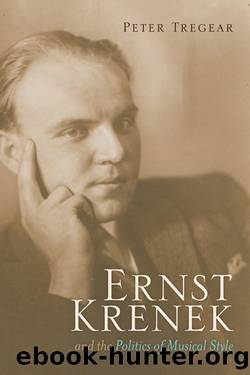Ernst Krenek and the Politics of Musical Style by Tregear Peter;

Author:Tregear, Peter;
Language: eng
Format: epub
ISBN: 1352221
Publisher: Scarecrow Press, Incorporated
Chapter 4
THE CITY OF GOD:
Karl V
[A]nyone who ventures to use the twelve-tone technic [sic] as a material in his musical works today has yielded to political art.
KURT LIST1
Woe unto the age that makes doubt its sovereign.
ERNST KRENEK2
The composition of Karl V amounted to an artistic, professional, and personal watershed, it possesses an artistic and biographical significance second only to Jonny; it.3 However, the circumstances of its composition and its subsequent reception could not have been more different. Composed in Vienna between June 13, 1932 and May 24, 1933 and dedicated to the Vienna Staatsoper and Clemens Kraus, the work arose out of an invitation from Kraus to create a new piece specifically for the State Opera.4 The invitation was no more than that; it was an agreement of trust, not a formal commission. Nevertheless, the possibility of composing a major new work for the premiere opera house in his home city, combined with the fact that Krenek was given free reign as to the subject matter and librettist, was more than enough incentive to commence work. In the face of increasing political pressure, however, both Krausâs enthusiasm and the amenability of the Vienna State Opera to perform a work that would most likely be portrayed as an exemplar of âMusikbolschewismusâ (musical bolshevism) faded quickly, and a scheduled first performance in Vienna was cancelled mid-rehearsal.5 Instead, Karl was eventually premiered in Prague on June 22, 1938 under the direction of Karl Rankl. This performance was a critical and even something of a popular success, but performances subsequently have been rare. It was not produced in Vienna until 1984.6
The first work to be written subsequent to Krenek having accepted the key elements of Adornoâs critical framework, the impetus for Krenek choosing to base his new opera, orâas he preferred to call itââstage-play with musicâ (Bühnenwerk mit Musik) around a historical subject, however, had its origins elsewhere. The idea first took concrete form after Krenek heard Milhaudâs opera Christophe Colomb at its premiere in Berlin on May 5, 1930.7 Under the championship of conductor Erich Kleiber, the opera had proved a great success; its Berlin season was to run for some two years.8 The interest it generated was due as much to the original dramatic form that had been conceived by its librettist, Paul Claudel, as it was to Milhaudâs âneo-classicâ score, and it was to be the libretto that made the deepest impression on Krenek.9 Christophe Colomb represented, he thought, nothing less than an attempt at a completely new interpretation of the relationship between music and drama, one whichâin particularâmight also offer a means of successfully combining dramatic material with the most advanced forms of new music: â⦠one can observe in it nothing less than the beginnings of what I would call the dialectical function of music in drama and in which, in connection with the new, the Viennese school might pursue musical objectives for the future of decisive meaning [entscheidender Bedeutung].â10 Krenek based his contention on Claudelâs peculiar presentation of
Download
This site does not store any files on its server. We only index and link to content provided by other sites. Please contact the content providers to delete copyright contents if any and email us, we'll remove relevant links or contents immediately.
Aircraft Design of WWII: A Sketchbook by Lockheed Aircraft Corporation(32139)
The Great Music City by Andrea Baker(30785)
Call Me by Your Name by André Aciman(19912)
The Art of Boudoir Photography: How to Create Stunning Photographs of Women by Christa Meola(18410)
The Secret History by Donna Tartt(18186)
Shoot Sexy by Ryan Armbrust(17560)
Plagued by Fire by Paul Hendrickson(17117)
Portrait Mastery in Black & White: Learn the Signature Style of a Legendary Photographer by Tim Kelly(16873)
Adobe Camera Raw For Digital Photographers Only by Rob Sheppard(16800)
Photographically Speaking: A Deeper Look at Creating Stronger Images (Eva Spring's Library) by David duChemin(16501)
Ready Player One by Cline Ernest(14003)
Pimp by Iceberg Slim(13787)
Bombshells: Glamour Girls of a Lifetime by Sullivan Steve(13691)
The Goal (Off-Campus #4) by Elle Kennedy(13207)
Art Nude Photography Explained: How to Photograph and Understand Great Art Nude Images by Simon Walden(12854)
Kathy Andrews Collection by Kathy Andrews(11329)
The Priory of the Orange Tree by Samantha Shannon(8626)
Thirteen Reasons Why by Jay Asher(8461)
The remains of the day by Kazuo Ishiguro(8402)
